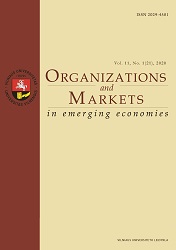Equilibrium and the Adjustment Process in the Number and Scope of Co-operatives in Morocco
Equilibrium and the Adjustment Process in the Number and Scope of Co-operatives in Morocco
Author(s): Adil Outla, Moustapha HamzaouiSubject(s): National Economy, Economic policy, Methodology and research technology, Economic development
Published by: Vilniaus Universiteto Leidykla
Keywords: equilibrium; entry-and-exit flow; mean-reverting; entrants; speed of adjustment;
Summary/Abstract: The paper discusses the government policy that encourages the emergence of co-operatives and analyzes the co-operatives in light of their growth in number. It establishes a static equilibrium and highlights the co-operatives’ adjustment process (dynamic equilibrium). The methodology/approach consists of the development of a theoretical model, using the Nash equilibrium for the co-operative market, and the determination of a static equilibrium. It presents the data which includes variable measurements for the adjustment process for agricultural, artisanal, and fishery co-operatives in order to analyze the stochastic process of entry-and-exit flow of co-operatives. Accordingly, the paper estimates the co-operatives’ growth index speed of adjustment (SOA) as a function of the mean-reversion Ornstein–Uhlenbeck (OU) process. The theoretical results indicate that co-operatives’ earnings depend on the number of co-operatives, market-demand, and the capacity constraint. They also show that the margin for new entrants is a dynamic gap that especially depends on demand, capacity constraint and the profits. The empirical results indicate that co-operatives growth-index process is significantly mean reverting for all sectors, and the speed of adjustment for artisanal co-operatives is significantly higher than for those in agriculture and the fisheries.
Journal: Organizations and Markets in Emerging Economies
- Issue Year: 11/2020
- Issue No: 21
- Page Range: 128-151
- Page Count: 24
- Language: English

